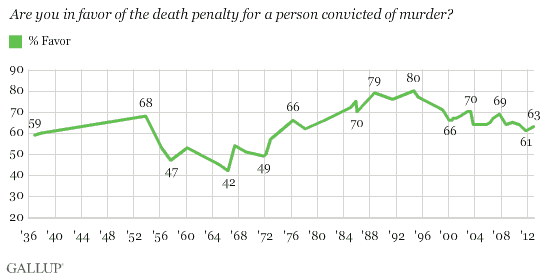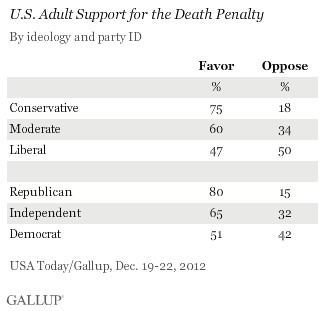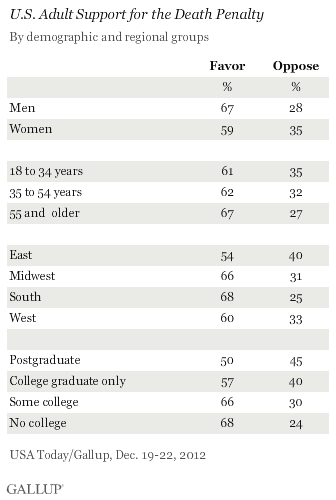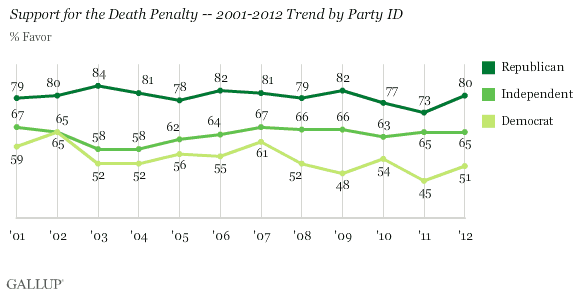PRINCETON, NJ -- Americans' support for the death penalty as punishment for murder has plateaued in the low 60s in recent years, after several years in which support was diminishing. Sixty-three percent now favor the death penalty as the punishment for murder, similar to 61% in 2011 and 64% in 2010.

Gallup first asked Americans for their views on the death penalty using this question in 1936, and has asked it at least annually since 1999. The latest results come from a Dec. 19-22, 2012, USA Today/Gallup survey, conducted in the first few days after the Newtown, Conn., school shooting massacre.
Although views on the death penalty have been fairly static since 2010, support has been gradually diminishing since the high point in 1994, when 80% were in favor. By 2001, roughly two-thirds were in favor, and since then it has edged closer to 60%.
The death penalty is not relevant in the Newtown case, given that the lone gunman took his own life after his rampage; however, the tragedy could have influenced Americans' thoughts about capital punishment and may be a reason support for it held steady this year, rather than declining any further.
Most Groups, but Not "Liberals," Lean in Favor of Death Penalty
The majority, or at least plurality, of most demographic and political groups are in broad agreement about supporting the death penalty as punishment for murder.
One exception to that is adults who describe their political views as "liberal." Just under half of liberals, 47%, favor the death penalty, while 50% oppose it. However, most conservatives and moderates support it, as do majorities of all party groups, including 51% of Democrats.

Additionally, nonwhites are closely divided on the issue, with 49% in favor and 45% opposed. That contrasts with whites, among whom 68% are in favor.
These patterns of support are consistent with previous Gallup findings on the death penalty. In addition, men continue to be more supportive than women of the death penalty, this year by 67% to 59%, and those without a college degree are more supportive than those with a college degree.
Consistent with their more Democratic political leanings, residents of the East are the least likely to favor the death penalty, while residents of the South and Midwest -- who tend to be the most Republican -- are the most likely.

Despite the moral nature of the death penalty as a political issue, with teachings on it differing among the various faiths, Gallup finds virtually no difference in support for it on the basis of respondents' religious background. Two-thirds of Protestants and Catholics, alike, are in favor of the death penalty as a punishment for murder, as are at least six in 10 adults regardless of whether they attend church weekly, monthly, or less often. Only among those who say they have no religious preference, which would include atheists and agnostics, is there a difference, with a slightly smaller 56% in favor of the death penalty.
There are, however, sharp differences in views about capital punishment by gun ownership. Those who report personally owning a gun are much more likely than those who do not have a gun to favor the death penalty: 80% vs. 55%.
Long-Term Drop in Support Seen Mainly Among Democrats
Gallup's annual measurement of death penalty views since 2001 shows that support for it has declined more among young adults (aged 18 to 34) than among those 55 and older, and more among men than among women.
Additionally, the trend differs by party ID, with support dropping most precipitously among Democrats, from 59% in 2001 to 51% today.
Gallup found a dip in support for the death penalty among independents in 2003, but their views since returned to prior levels and, at 65%, independents' current support for the death penalty is similar to what it was in 2001. At 80%, Republicans' current support also matches the 2001 level.

Bottom Line
Americans' support for the death penalty has varied widely over the 77 years Gallup has measured it, and now stands at 63%, which is about average for the full trend. Gallup's initial reading in 1936 found 59% in favor, but support then dipped well below 50% at points during the 1960s, only to surge above 70% in the 1980s. Support remained high through the first part of this century, but has since waned, possibly relating to several states recently imposing moratoriums on executions or abolishing their death penalty statutes altogether.
The future course of public support for the death penalty may depend as much on the impact of unforeseen tragedies such as the Oklahoma City bombing or Newtown shootings, as it does on political campaigns by death penalty supporters and opponents. However, for now, views appear to be at a standstill, with just over six in 10 Americans in favor, essentially unchanged since 2010.
Survey Methods
Results for this USA Today/Gallup poll are based on telephone interviews conducted Dec. 19-22, 2012, with a random sample of 1,038 adults, aged 18 and older, living in all 50 U.S. states and the District of Columbia.
For results based on the total sample of national adults, one can say with 95% confidence that the maximum margin of sampling error is ±4 percentage points.
Interviews are conducted with respondents on landline telephones and cellular phones, with interviews conducted in Spanish for respondents who are primarily Spanish-speaking. Each sample includes a minimum quota of 400 cellphone respondents and 600 landline respondents per 1,000 national adults, with additional minimum quotas among landline respondents by region. Landline telephone numbers are chosen at random among listed telephone numbers. Cellphone numbers are selected using random-digit-dial methods. Landline respondents are chosen at random within each household on the basis of which member had the most recent birthday.
Samples are weighted by gender, age, race, Hispanic ethnicity, education, region, adults in the household, population density, and phone status (cellphone only/landline only/both, cellphone mostly, and having an unlisted landline number). Demographic weighting targets are based on the March 2011 Current Population Survey figures for the aged 18 and older U.S. population. All reported margins of sampling error include the computed design effects for weighting.
In addition to sampling error, question wording and practical difficulties in conducting surveys can introduce error or bias into the findings of public opinion polls.
View methodology, full question results, and trend data.
For more details on Gallup's polling methodology, visit www.gallup.com.
